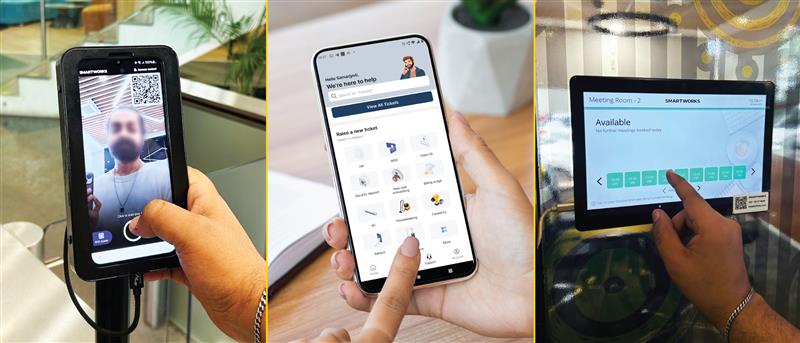How Tech-Integrated Workspaces Are Delivering Best Office Experiences

Current workplace evolution continues at a pace never before seen because of immense technological progress. New technologies have transformed business operations by changing workforce tools along with physical workplace designs. The impact of technology displays itself throughout all activities in professional settings as organizations focus on productivity development and teamwork advancement while building better working conditions.
Eco-friendly and Sustainable Office Solutions
Technological advancements enable workplaces to transition toward sustainable initiatives which have become a prominent workplace requirement for many organizations. Several companies adopt sustainable office solutions together with eco-friendly office designs for two primary reasons: to achieve stress reduction on the environment and to build workplaces with improved health benefits for staff members' productivity.
The key elements of environmentally friendly building practices include smart lighting technology combined with energy-efficient HVAC systems and automated control systems. The optimised energy systems help organizations fulfil their sustainability objectives while maintaining both employee comfort levels and workplace efficiency. Building sensors help manage lighting and temperature settings according to occupancy levels enabling an efficient power usage when the space is vacant. As supply chains and design expand their range toward more sustainable materials, the utilisation of reclaimed or recycled office elements in design has increased.
Sustainable building designs integrating renewable energy technology through solar panels and wind turbines now define the contemporary commercial market. Real-time monitoring enabled by smart building technologies tracks sustainability goals by monitoring building energy usage with water usage and indoor air quality evaluation. The deployment of these technologies helps organizations save their utility expenses through sustainable improvements which also serve to boost office sustainability.
Innovative Workspaces to Boost Employee Productivity
Another area where technology is making a profound impact is in the design of innovative workspaces. As companies recognize the importance of employee productivity and wellbeing, they are turning to technological solutions that create work environments conducive to both.

For example, modern workspace amenities like adjustable standing desks, ergonomic chairs, and high-tech meeting rooms are becoming essential features of office interiors. Smart offices can automatically adjust to the needs of employees, with lighting, temperature, and even sound levels customized based on individual preferences or the time of day. This flexibility ensures that employees can work in an environment that supports their comfort and health, ultimately leading to higher employee productivity.
Additionally, the rise of collaborative technologies such as video conferencing tools, instant messaging platforms, and cloud-based file sharing has revolutionized communication and collaboration in the workplace. These tools allow employees to work seamlessly across different locations, increasing flexibility and promoting better collaboration among team members, even if they are not physically in the same office.
Efficiency at the Workplace
Technology has also played a crucial role in improving efficiency at the workplace. With the introduction of automated workflows, task management tools, and project management software, businesses can streamline operations and reduce the administrative burden on employees. These tools help teams stay organised, manage deadlines, and track progress, which ultimately results in better use of time and resources.
Furthermore, AI and machine learning technologies are increasingly being integrated into office environments to support decision-making processes. These technologies analyse data to predict trends, improve resource allocation, and optimise business operations.
Workplace Employee Experience and Wellbeing
The role of technology in shaping the workplace employee experience is becoming more prominent, especially in terms of enhancing employee wellbeing. Modern office designs are no longer just about aesthetics; they focus on creating a space that supports the mental and physical health of employees.
Many companies also implement wellness apps or wearable devices to track employee health metrics, such as sleep patterns, heart rate, and stress levels. These tools help employees maintain a healthy work-life balance, which has been shown to improve productivity and reduce burnout.
In addition, workplace security is another vital aspect of employee wellbeing. Advanced security systems, including biometric authentication, surveillance cameras, and digital access controls, ensure that employees feel safe in their workspace. These technologies also help companies maintain compliance with safety regulations, further contributing to a secure and supportive environment.
The Future of Technology-Driven Workspaces
Technology will influence workplace operations throughout the forthcoming years. Modern workplace solutions such as hybrid working models depend on cloud technology and video conference software to develop new office environments. Workspace providers are transforming their offices by introducing reconfigurable spaces which enable both flexible team reallocations and different project setups.

The increasing implementation of augmented reality (AR) along with virtual reality (VR) systems will become standard practice in professional workspaces. Augmented reality technologies alongside virtual reality systems can develop entire virtual workspaces which maintain employee presence in their remote working locations as well as conduct interactive team sessions in real-time.
Artificial intelligence implementations for employee management combined with employee training will steadily improve the workplace environment for the future. Powered by artificial intelligence personal learning platforms enable workers to build new professional skills as they choose when to learn thus reinforcing their occupational development and workplace contentment.
Conclusion
Modern technology operates as a total work environment transformer which leads to enhanced efficiency alongside sustainability and improved focus on employee requirements. Leading technologies help businesses build sustainability-centred work environments through eco-friendly solutions that drive productivity and wellness for their staff members and the environment. Advancements in technology will drive the workplace toward additional adaptability and improved workplace collaboration and alignment with current workforce needs.
Find the perfect workspace for you
Fill out the form below and our team will contact you.
 01 Sept
01 Sept